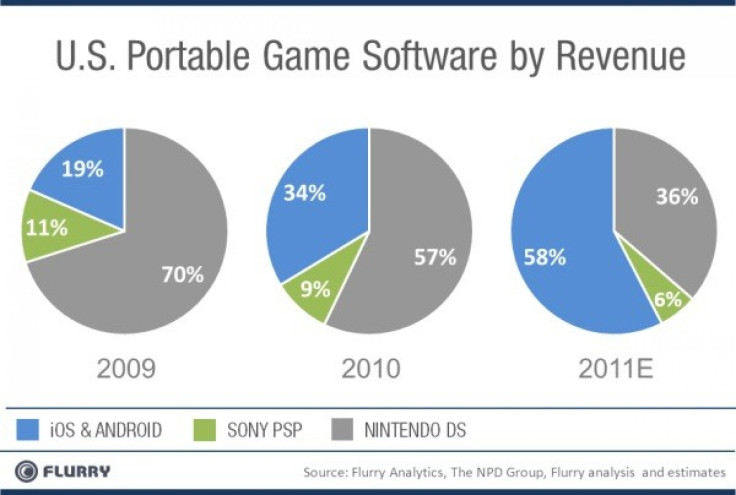iOS and Android Hijack Mobile Gaming Market

Like a pair of French bandits, iOS and Android smartphones have wrenched control of the mobile gaming industry away from Nintendo and Sony.
In a recent blog post, Flurry Analytics showed just how sharply smartphone gaming has risen in sales. In 2009 the two mobile OSes controlled about 19 percent of the market. In 2011, the duo grabbed majority control of about 58 percent.
Nintendo has dominated the market since the late '80s with its Game Boy system, but retired it in favor of the Nintendo DS in 2004. In the three-year span, the DS's control dropped from a commanding 70 percent of the market in 2009 down to 36 percent in 2011.
Sony's PSP has had trouble getting a foothold in the market starting at 11 percent control in 2009, and slipping to 6 percent at the end of the study.
Flurry calculated the mobile gaming industry was worth $2.7 billion in the U.S. in 2009, as well as $2.5 billion in 2010, and $3.3 billion in 2011.
Flurry credited the freemium business model for the success of mobile phone gaming. Most games on these platforms release a free version with more power-ups and levels available for purchase. That is opposed to the way Nintendo and Sony generate cash by selling consoles for around $200 and charging around $40 a game after that.
Also helpful are the mobile phones' large install bases. Apple and Google both reported a total of 250 million iOS and 190 million Android devices activated, in their latest respective press events. That is compared to the 149 million Nintendo DS consoles and 70.7 million PSPs sold, according to VGChartz.
The markets have not been kind to Nintendo lately. The company has posted losses for the first time since it has been reporting its finances in 1981. With slumping Wii sales and an overly-strong yen the company reported losses of $926 million.
The news doesn't bode well for Nintendo and Sony as Apple and Google run away with the mobile market. The two might take further bites out of the gaming giants' revenues as they seek to enter the living room. But they will then have to contend with Microsoft in the home console battle.
© Copyright IBTimes 2024. All rights reserved.











